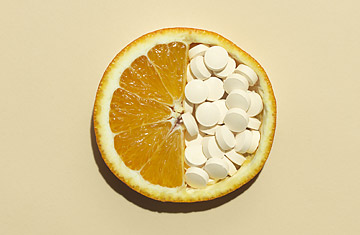
Vitamin-C pills don't fall into either category. Instead, they're part of the incredibly popular, poorly regulated world of dietary supplements
The first question isn't why but why not? Vitamins, probiotics, omega-3 capsules, antioxidant pills: they can't hurt, right? Around the corner of each advancing birthday lurks a possible affliction — arthritis, cancer, Alzheimer's — and a giant industry has emerged to try to prevent them all. Americans now spend an estimated $28 billion a year on dietary supplements — more than twice what we spent in 1995 and more than $5 billion more than what we pay each year for gym memberships. But do supplements actually work?
Dietary supplements occupy the broad, poorly regulated space between two more-defined kinds of consumables: foods and drugs. Because they can and sometimes do provide both nutrition without eating and wellness without medicine, supplements have acquired a new name in recent years: nutraceuticals.
When I turned 40 last year, I decided to subject myself to a nutraceutical regimen. For five months, I took 22 pills a day. There were also protein bars, powder drinks and enough psyllium fiber to regulate an elephant — but before I took anything, I got a blood test. In January, a lab measured the baseline levels of calcium, protein, sodium, cholesterol and other substances in my blood. After five months and more than 3,000 pills, I had another blood test to see what, if anything, had changed.
I didn't randomly pick the pills I took. A new, highly lucrative trend in the nutraceutical business is a personalized approach. You provide the supplement company with details of your eating habits and medical history, and it sells you a customized suite of products. (No supplement company I found actually looks at blood results in advance.) If you don't eat much fish, you'll get an omega-3 pill. If you have trouble sleeping, melatonin is on the way.
Whether nutraceuticals improve health — and how — is a matter of enormous scientific inquiry. New studies emerge regularly. Take one recent week: on June 27, the Journal of Clinical Oncology published the results of a Stanford study showing that a tablet with calcium and vitamin D may lower your chances of getting skin cancer. That same day, the Public Library of Science (PLOS) reported that a compound called fisetin, which is found in strawberries, reduces the severity of complications from diabetes. On June 30, a team of 18 researchers from France and the U.S. announced that a daily dose of resveratrol — a substance found in grapes that winemakers love to tout — may help prevent loss of bone-mineral density.
And yet all three studies turned out to have shortcomings common to nutraceutical research. The Stanford paper was based on just 176 women chosen because they had a history of a specific type of skin cancer. The PLOS study as well as the France-U.S. one looked only at rodents. When I met with Dr. Glenn Braunstein, chairman of the department of medicine at Cedars-Sinai Medical Center in Los Angeles and an expert on nutraceuticals, he was frank about the state of the research in general. Overall, he said, "the data is lousy." Many nutraceutical studies have tiny sample sizes and lack placebo controls. Braunstein added that because some supplements have 10 or more ingredients, it's difficult to determine which ingredient is doing what.
So I was surprised when Braunstein revealed that he takes a nutraceutical product, a tablet containing 2,000 international units of vitamin D. What about all that stuff about poor sample sizes and placebo controls? He said a growing body of high-quality literature is showing that even those who live in sunny climates can have low vitamin-D levels. (When exposed to sun, the body naturally produces vitamin D.) He also said that even though he is an avid runner, he discovered not long ago that his blood contained 26 nanograms per milliliter (ng/ml) of vitamin D, below the 30 ng/ml level that many doctors see as a healthy baseline. After he started taking the supplement, his score shot into the high 30s. My vitamin-D measure also skyrocketed when I took nutraceuticals: I went from 28 ng/ml in January to 49 ng/ml in June.
So it turns out that some nutraceuticals work, at least enough for a skeptical medical-department chairman to take a daily just-in-case dose. Braunstein said there's debate in the medical community over whether 30 ng/ml is really the right benchmark for vitamin D, but all the questions led me back to the original one. Why not take supplements just to be safe? Admittedly, that's more a question of faith than of science, a question that recalls a classic discussion about religion: If you go to services every week but it turns out there's no God, no harm done. But if you choose a reckless path, you burn for eternity. So just swallow the pill, right?
